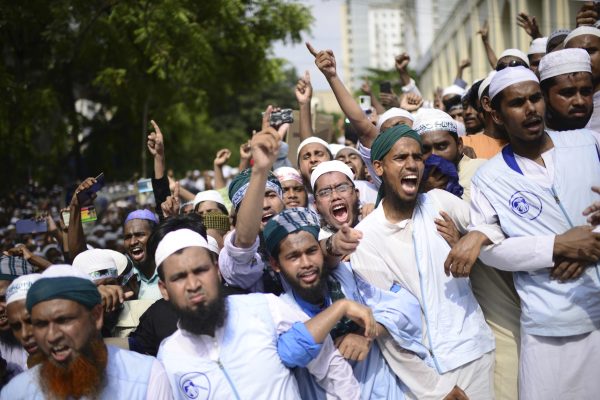
Despite mass demonstrations protesting the comments by BJP leaders defaming the Prophet, the Awami League government has remained silent.
Muslims shout slogans against Nupur Sharma, a spokesperson of India’s governing Hindu nationalist party as they react to the derogatory references to Islam and the Prophet Muhammad made by her, during a protest outside a mosque in Dhaka, Bangladesh, Friday, June 10, 2022.
On June 10, thousands of people marched in Dhaka, the capital of Bangladesh, to protest derogatory comments made by two officials of India’s ruling Bharatiya Janata Party (BJP) about Prophet Muhammad. Angry protesters urged Muslim-majority nations to cut ties with India and boycott its products unless the two were punished for defaming Prophet Muhammad.
Unlike the governments of other Muslim-majority countries, Bangladesh’s Awami League government has remained silent on the offensive comments made by the BJP leaders.
“First of all, this is an external issue [for Bangladesh]. This is the issue of India, not of Bangladesh. We don’t have to say anything,” Bangladesh’ Minister of Information Hasan Mahmud said.
The Hasina government’s silence on the controversial issue has angered Bangladesh’s Islamists, who have urged the government to protest officially.
Diplomat Brief Weekly Newsletter N Get briefed on the story of the week, and developing stories to watch across the Asia-Pacific. Get the Newsletter
The mass protests in Bangladesh against the offensive comments of BJP leaders signal another surge in anti-India sentiment in Bangladesh.
Enjoying this article? Click here to subscribe for full access. Just $5 a month.
Similar protests erupted when Indian Prime Minister Narendra Modi visited Bangladesh in March 2021 to participate in the celebration of the 50th anniversary of its independence. Many Islamist parties protested his visit due to his actions and policies that are marginalizing Muslims in India. The protests, which turned violent killed at least four and injured 40 others.
Historically, India and Bangladesh have enjoyed warm relations. India supported Bangladesh’s struggle for liberation from Pakistan and provided millions of Bangladeshis with sanctuary during the war. Many still feel gratitude for India’s support in 1971.
However, there are others who believe that India helped Bangladesh to further its own interest; to weaken and split Pakistan. A reflection of this thinking is found in the narratives of the extremist group, Ansar Al Islam, according to which Bangladesh’s war for independence was an Indian plot to weaken the Muslim position in South Asia.
Even though India helped Bangladesh emerge an independent country, anti-India sentiment began to grow within years of its liberation. In 1976, protests erupted in Bangladesh over the issue of the sharing of the waters of the River Ganges, a transboundary river that flows from India to Bangladesh.
Bangladeshi political scientists have drawn attention to India’s “problematic relations with all its immediate neighbors (except tiny Maldives).” India’s neighbors “love to hate India,” Taj Hashmi, a professor of security studies wrote in Daily Star, and pointed out that “Bangladesh is not an exception in this regard.” “For all the right and wrong reasons, many pro-independence, liberal, secular and left-oriented Bangladeshis turned anti-Indian, not long after the Liberation. They imputed the post-Liberation socio-economic and political crises [facing Bangladesh] to India’s colonial designs and ambitions.”
There are several issues that trouble India-Bangladesh bilateral relations. Foremost among these are long-running disputes over the sharing of waters of the Teesta and Tipaimukh. Some analysts described the dispute over the sharing of the Teesta’s waters as “a prolonged suffering inflicted by India.”
Another issue, which has impacted Bangladesh’s perception of India are the killings of Bangladeshi nationals by Indian border guards. In July 2019, Bangladesh’s home minister informed parliament that 294 Bangladeshis had been killed by India’s Border Security Force in the preceding decade. This has resulted in India losing Bangladeshi goodwill.
Apart from these festering bilateral issues, India’s alleged interference in the internal affairs of Bangladesh is stirring anger. India allegedly “armed, trained and sheltered thousands of Shanti Bahini guerrillas to bleed Bangladesh” for two decades up to the late 1990s.
Several people who I interviewed for my doctoral research between 2017 and 2019 said that events in India affect people in Bangladesh. Violent protests in Bangladesh over Modi’s discriminatory policies and laws targeting Muslims and the more recent offensive comments about Islam are examples of such impact.
Despite the mass protests to the BJP government’s anti-Muslim policies and actions, the Bangladesh government has been silent.
Enjoying this article? Click here to subscribe for full access. Just $5 a month.
With Prime Minister Sheikh Hasina scheduled to visit India in July this year, it is likely that the government is reluctant to ruffle feathers in Delhi ahead of that visit. Additionally, her government is under pressure from the U.S. and Japan to hold free and fair elections that are scheduled for 2023. She will be looking to India for support on the matter.







